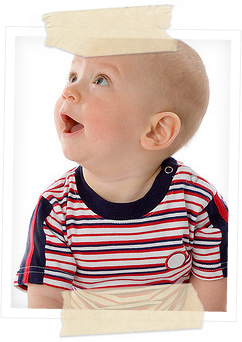What a sweet, sweet bundle of joy. Congratulations!
Right now, they’re probably cooing, and just starting to smile that gummy, toothless smile. But it won’t be toothless for long. Before you know it, their first tooth will appear and then they’ll head off to college. Follow these guidelines to help your baby on a way to a lifetime of healthy smiles!
Caring for Gums
Even with no teeth, your baby’s gums will benefit from your care. Take one finger and a clean, damp washcloth and rub gently along the gum line after each feeding. Doing so will clear your little one’s mouth of any leftover food and begin to foster good oral care habits.
Baby’s First Tooth
Look, a tooth! It’s time to buy a baby toothbrush; choose one with a long handle that you and he can hold at the same time, or one that fits like a puppet over your finger. With either type, the bristles are soft so as to not irritate the brand new tooth. Sweet baby doesn’t like the brush? That’s okay. Use a damp washcloth for a while longer and try the toothbrush again later.
Brushing with Toothpaste
There’s no need to use toothpaste at first, but as he starts to get a few more teeth. You’ll want to use one without fluoride for the first two years, and only a teeny tiny amount on the brush. Have your little one practice spitting the toothpaste out after brushing to prepare him for fluoride toothpaste, which should not be swallowed at any age.
Avoiding Cavities
Don’t give your baby any sort of sweetened liquids such as flavored drinks or soda. Even the sugars present in fruit juice, formula, and milk (this goes for breast milk as well) can cause decay, so regular tooth and gum cleaning is vital. Also, and this is really important: Never send them to bed with a bottle. Sugary liquids allowed prolonged contact with his teeth all but guarantee early childhood decay.
First Visit to the Dentist
Your Baby should visit the dentist for the first time within six months of the first tooth’s eruption, or no later than their first birthday. Many people don’t realize even the smallest teeth are susceptible to decay, and so the earlier you bring him or her, the better off they’ll be. We’ll look for any signs of early problems with your baby’s oral heath, and check in with you about the best way to care for her teeth. Remember that preparing for each dental visit with a positive attitude goes a long way toward making your child comfortable with regular checkups.
Pediatric dental care services offered include:
- Dental exams & cleaning
- Mouthguards
- Fluoride
- Sports dentistry
- Cavities
- Pediatric dental sedation
- And more!
Setting a Good Example
Kids are a sponge at this age. An expert mimic, They’ll want to do anything and everything they see you doing. Brush and floss daily while your child watches, and make it seem fun. As soon as they show interest, buy their very own toothbrush and encourage your child to mirror your actions.
Most children aren’t able to effectively clean their own teeth until the age of six or seven, so you’ll have to do that part, but getting him or her in the habit, and laying the groundwork for that kind of muscle memory will go a long way. The primary goal is to instill healthy oral habits at an early age to set your child up for a lifetime of healthy, cavity-free teeth!

